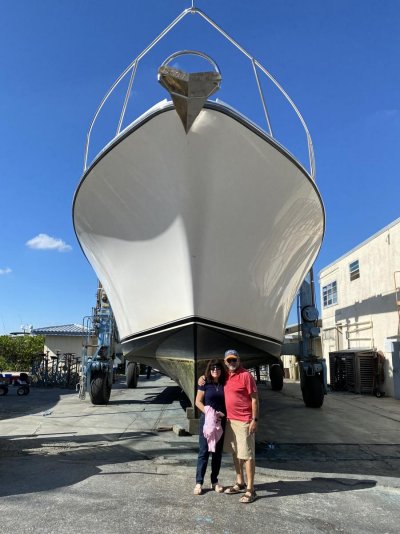Keep in mind that it is layout, not length, that will dictate comfort. I have been on 50 foot boats that have less cabin room than my 40 foot boats.
Things like having a walk around full queen bed, separate shower stall, comfortable day seating, headroom, galley space, etc.
Ditto on the other posts about insurance. Most companies do not want to see you jump more than 10 feet at a time. Depending on company and your prior experience of course.
I'd like to jump in with NStenger... to agree with the above post; its contents hit another nail on the head! And, several other posts in this thread have already well hit additional nails the head!.
In this case, some boats are laid out well... others not so much. Due to our using our boat only for long weekends, holidays and occasional cruise we went from coming close to purchasing a 48' Tollycraft to instead purchasing a twin screw, flying bridge - 34' tri cabin Tollycraft.
Reasons for doing so:
- Fantastically spacious, comfortable, useable and easy-care layout for a 34' boat. Besides, when we located this baby she'd just been completely refurbished, looked/ran great and was at the correct price - what's not to LOVE!
- Covered vast majority of our wants and all of our must-haves aboard our "play-toy" boat. I mean, to be rational... if you're not living aboard then pleasure boats are simply adult "Play-Toys" - right?
- Easily fits in 40' X 14' covered berth - Saves oodles of maintenance expense/money and so much personal time regarding boat-exterior care.
- Insurance easy to get and affordable.
- Super easy to handle in all tight places... fuel docks, covered berth, tight canals, crowded bays while anchoring... etc...
- Hauling, bottom painting costs lower than same for larger boats.
- This 34' Tolly's planing hull draft is only 2'10" - with an accurate depth sounder and twins for intricate maneuvering at
very slow speeds [idle rpm] that opens gunk-hole opportunities that larger, deeper draft boats can't touch.
- She carries enough weight to readily handle seas encountered. And, her twin screws did what ever we desired. Due to planing hull design [although we usually cruise at considerably affordable 7 knots] there are times we jump her onto plane and cruise at 16 to 17 knots - more fuel per MOG but much less time from point A to B. And... if reason/need suddenly comes up to get some place quickly we can push her along at 20 nmph without hitting WOT [that's 22 to 23 nmph]. Happened to us twice in 15 years with this boat; one was a physical emergency of our matriarch/granny back in town, the other was incoming bad weather.
Sooo... I mention the above to assure you there are some not-so-big boats that are quite seaworthy as well as comfortable and easy to handle. With, considerable affordability as a plus!
It all depends on "What Floats Your Boat"

Pun intended!!


 Pun intended!!
Pun intended!!